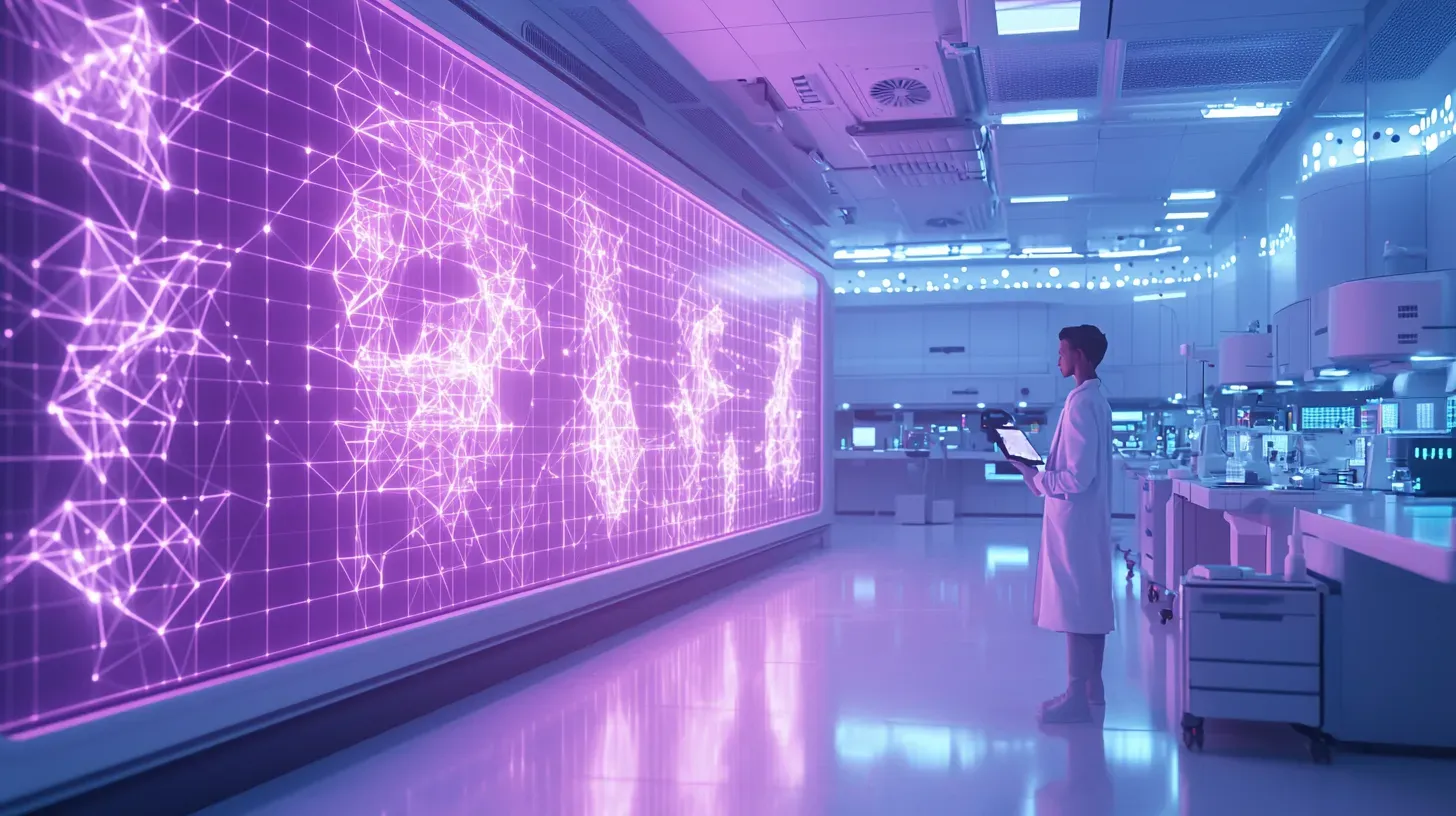Understanding Cybersecurity Through a Strategy Futurist's Lens

Understanding Cybersecurity Through a Strategy Futurist's Lens
In today's ever-evolving digital landscape, there is no denying the crucial role that cybersecurity plays in protecting our organizations, data, and privacy. With cyber threats becoming increasingly sophisticated, it is essential to gain a comprehensive understanding of this complex field. And what better way to explore the world of cybersecurity than through the lens of a strategy futurist?
Understanding the Role of Cybersecurity in Today's Digital Landscape
Before diving into the fascinating world of strategy futurism and its impact on cybersecurity, let's first establish a solid foundation by exploring the role of cybersecurity in our digital landscape. In our interconnected world, organizations of all sizes face constant threats ranging from data breaches to sophisticated hacking attempts.
As technology continues to advance at an astonishing pace, cybercriminals leverage these advancements to their advantage. The consequences of a successful cyber attack can be devastating, leading to financial losses, reputational damage, and even legal ramifications.
Therefore, it is crucial for organizations and individuals alike to recognize the importance of implementing robust cybersecurity measures and staying ahead of the curve.
One of the key aspects of cybersecurity is the protection of sensitive data. In today's digital landscape, data is the lifeblood of organizations. It encompasses everything from customer information to trade secrets and financial records. Without proper cybersecurity measures in place, this valuable data is at risk of being compromised.
Cybersecurity also plays a vital role in safeguarding critical infrastructure. From power grids to transportation systems, many essential services rely on interconnected networks. A successful cyber attack on these systems can have far-reaching consequences, disrupting daily life and causing widespread chaos.
Moreover, cybersecurity is not just a concern for large organizations. Small businesses and individuals are equally vulnerable to cyber threats. In fact, cybercriminals often target smaller entities as they may have weaker security measures in place.
With the rise of the Internet of Things (IoT), the importance of cybersecurity has become even more pronounced. IoT devices, such as smart home appliances and wearable technology, are interconnected and collect vast amounts of personal data. Without proper security protocols, these devices can become entry points for cyber attacks.
As the threat landscape evolves, so does the field of cybersecurity. New technologies, such as artificial intelligence and machine learning, are being employed to detect and mitigate cyber threats in real-time. Additionally, cybersecurity professionals are constantly updating their skills and knowledge to stay ahead of cybercriminals.
In conclusion, cybersecurity is a critical component of our digital landscape. It protects sensitive data, safeguards critical infrastructure, and ensures the privacy and security of individuals and organizations. By understanding its role and implementing robust cybersecurity measures, we can navigate the digital world with confidence and resilience.
How a Strategy Futurist Enhances Cybersecurity Understanding
Now, let's introduce the concept of a strategy futurist. A strategy futurist is an individual who combines the art of strategic thinking with a deep understanding of future trends and emerging technologies. By analyzing current and future threats, a strategy futurist can provide valuable insights and guide organizations in making informed decisions regarding their cybersecurity measures.
While cybersecurity professionals focus on implementing and managing technical security controls, the role of a strategy futurist goes beyond that. They take a holistic approach by considering not only the technological aspects but also the social, economic, and political factors that influence cybersecurity.
One of the key responsibilities of a strategy futurist is to explore potential future scenarios. By envisioning different possibilities, they can identify emerging threats that may arise as technology continues to advance. For example, with the rise of artificial intelligence and machine learning, cybercriminals may exploit these technologies to launch more sophisticated attacks. A strategy futurist can anticipate such threats and help organizations develop proactive strategies to mitigate risks.
In addition to technological advancements, a strategy futurist also takes into account social factors that can impact cybersecurity. They analyze how human behavior and societal trends can create vulnerabilities in an organization's security posture. For instance, the increasing use of social media and online platforms has opened up new avenues for cybercriminals to gather information and launch targeted attacks. By understanding these social dynamics, a strategy futurist can assist organizations in implementing effective security measures that address both technological and human vulnerabilities.
Economic factors also play a significant role in cybersecurity. A strategy futurist examines how economic trends, such as globalization and digital transformation, can influence the threat landscape. For example, as more businesses move their operations online, the potential for cyber attacks increases. A strategy futurist can help organizations navigate these economic challenges by providing insights on emerging cyber threats and recommending appropriate security measures.
Furthermore, political factors have a profound impact on cybersecurity. A strategy futurist analyzes how geopolitical events, government policies, and regulations can shape the cyber threat landscape. For instance, tensions between nations can lead to state-sponsored cyber attacks, posing significant risks to organizations. By staying abreast of these political developments, a strategy futurist can guide organizations in adapting their cybersecurity strategies to address these evolving threats.
In conclusion, a strategy futurist enhances cybersecurity understanding by taking a comprehensive approach that encompasses technological, social, economic, and political factors. By exploring potential future scenarios and identifying emerging threats, they help organizations develop proactive strategies to mitigate risks and enhance their cybersecurity posture. In an ever-evolving digital landscape, the role of a strategy futurist is crucial in ensuring the resilience and security of organizations.
The Importance of Predictive Analytics in Cybersecurity
Predictive analytics plays a vital role in the field of cybersecurity, allowing organizations to anticipate and prevent potential cyber threats. By leveraging vast amounts of data and applying advanced algorithms, predictive analytics can identify patterns, anomalies, and potential vulnerabilities.
These valuable insights enable organizations to take preemptive actions, such as patching vulnerabilities, strengthening security controls, and detecting and responding to threats before they materialize into serious breaches.
Additionally, predictive analytics can help organizations prioritize their cybersecurity efforts, focusing on the areas with the highest risk or likelihood of being targeted. This proactive approach helps optimize resource allocation and ensures maximum protection against imminent threats.
One of the key benefits of predictive analytics in cybersecurity is its ability to detect and prevent emerging threats. Cybercriminals are constantly evolving their tactics, making it challenging for traditional security measures to keep up. However, predictive analytics can analyze historical data and identify patterns that indicate the presence of new and emerging threats. This allows organizations to stay one step ahead of cybercriminals and implement necessary measures to protect their systems and data.
Furthermore, predictive analytics can provide organizations with real-time insights into their cybersecurity posture. By continuously monitoring and analyzing data from various sources, such as network logs, user behavior, and threat intelligence feeds, predictive analytics can generate actionable intelligence. This enables organizations to make informed decisions and respond promptly to potential threats, minimizing the impact of cyber attacks.
Another advantage of predictive analytics in cybersecurity is its ability to enhance incident response capabilities. When a cyber attack occurs, time is of the essence. Predictive analytics can help organizations detect and respond to incidents faster by automating the analysis of security events and generating alerts for suspicious activities. This reduces the time taken to investigate and mitigate threats, allowing organizations to minimize the damage caused by cyber attacks.
Moreover, predictive analytics can assist organizations in predicting future cyber threats and trends. By analyzing historical data and identifying patterns, predictive analytics can provide insights into the types of attacks that are likely to occur in the future. This knowledge can help organizations develop proactive strategies and implement preventive measures to mitigate the risks associated with these predicted threats.
In conclusion, predictive analytics is a powerful tool in the field of cybersecurity. Its ability to analyze vast amounts of data, detect emerging threats, provide real-time insights, enhance incident response capabilities, and predict future threats makes it an invaluable asset for organizations seeking to protect their systems and data from cyber attacks. By leveraging the power of predictive analytics, organizations can stay ahead of cybercriminals and ensure the security of their digital assets.
The Strategy Futurist's Approach to Improving Cybersecurity Measures
Now that we understand the impact of strategy futurism and predictive analytics on cybersecurity, let's delve into the strategy futurist's approach to enhancing cybersecurity measures.
A strategy futurist begins by conducting a comprehensive assessment of an organization's current cybersecurity framework. This involves analyzing existing systems, processes, and controls to identify strengths, weaknesses, and potential gaps in security.
During the assessment phase, the strategy futurist employs advanced tools and techniques to gather data on the organization's cybersecurity posture. This can include vulnerability scans, penetration testing, and threat intelligence analysis. By leveraging these resources, the strategy futurist gains a deep understanding of the organization's current security landscape.
Based on this assessment, the strategy futurist works closely with key stakeholders, such as IT teams, executives, and board members, to develop a tailored and forward-looking cybersecurity strategy. This strategy encompasses a range of initiatives, including technology investments, employee training programs, and incident response plans.
The strategy futurist recognizes the importance of investing in cutting-edge technologies to bolster an organization's cybersecurity defenses. This may involve implementing next-generation firewalls, intrusion detection systems, and advanced threat intelligence platforms. By leveraging these technologies, organizations can detect and mitigate cyber threats more effectively.
In addition to technology investments, the strategy futurist emphasizes the significance of employee training programs. These programs aim to educate employees about the latest cyber threats and best practices for maintaining a secure digital environment. By fostering a culture of cybersecurity awareness, organizations can empower their workforce to become the first line of defense against potential attacks.
Furthermore, the strategy futurist guides organizations in embracing a proactive rather than reactive approach to cybersecurity. By continuously monitoring and analyzing emerging threats and trends, organizations can evolve their cybersecurity measures to stay one step ahead of potential attackers.
As part of this proactive approach, the strategy futurist encourages organizations to establish robust incident response plans. These plans outline the steps to be taken in the event of a cyber incident, ensuring a swift and effective response. By rehearsing these plans through regular tabletop exercises and simulations, organizations can enhance their ability to mitigate the impact of cyber attacks.
Moreover, the strategy futurist emphasizes the importance of collaboration and information sharing among organizations. By participating in industry-specific information sharing forums and establishing partnerships with other organizations, businesses can gain valuable insights into emerging threats and effective defense strategies.
In conclusion, the strategy futurist's approach to improving cybersecurity measures involves conducting a comprehensive assessment, developing a tailored strategy, investing in advanced technologies, implementing employee training programs, adopting a proactive mindset, establishing robust incident response plans, and fostering collaboration within the industry. By following this approach, organizations can enhance their cybersecurity posture and better protect themselves against evolving cyber threats.
Building a Cyber-Resilient Organization for the Future
In an increasingly interconnected world, it is not enough to simply mitigate risks; organizations must build resilience against cyber threats. Cyber-resilience goes beyond implementing security controls and involves developing a culture of cybersecurity awareness and preparedness.
A strategy futurist recognizes the importance of fostering a cyber-resilient organization. This involves establishing robust incident response plans, conducting regular security awareness training for employees, and implementing continuous monitoring and testing to identify vulnerabilities.
Moreover, a cyber-resilient organization understands that cybersecurity is a shared responsibility. It fosters collaboration and communication between different departments, promotes a culture of reporting potential threats, and stays informed about the ever-changing cybersecurity landscape.
By adopting a proactive mindset and integrating cybersecurity into the DNA of an organization, a cyber-resilient organization can effectively navigate the challenges and uncertainties of the future.
Conclusion
Understanding cybersecurity through a strategy futurist's lens provides a unique perspective that goes beyond mere technical aspects. By combining strategic thinking, predictive analytics, and a proactive approach, organizations can enhance their cybersecurity measures and build resilience against evolving threats.
As we venture forward in this fast-paced digital landscape, let us embrace the insights and guidance offered by strategy futurists to pave the way towards a safer and more secure future.
FAQs
1. What is the role of cybersecurity in today's digital landscape?
Cybersecurity plays a crucial role in protecting organizations, data, and privacy in our interconnected world. It safeguards sensitive data, ensures the protection of critical infrastructure, and addresses the vulnerabilities faced by both large organizations and small businesses.
2. How does a strategy futurist enhance cybersecurity understanding?
A strategy futurist takes a holistic approach to cybersecurity by considering technological, social, economic, and political factors. They analyze potential future scenarios, identify emerging threats, and assist organizations in developing proactive strategies to mitigate risks.
3. What is the importance of predictive analytics in cybersecurity?
Predictive analytics plays a vital role in cybersecurity by analyzing data, detecting patterns, and identifying potential vulnerabilities. It helps organizations anticipate and prevent cyber threats, prioritize cybersecurity efforts, enhance incident response capabilities, and predict future cyber threats and trends.
Contact a Strategy Futurist for Your Event
Are you ready to bring the future into focus at your next event? Dr Mark van Rijmenam, an established Strategy Futurist, can guide your audience through the complex world of cybersecurity, predictive analytics, and future trends. With his unique insights and deep understanding of the digital landscape, Dr van Rijmenam can help your organization anticipate and prepare for the evolving cyber threats. His engaging presentations will not only educate your audience but also inspire them to take proactive steps towards building a cyber-resilient organization. Don't miss this opportunity to have Dr van Rijmenam illuminate the path to a secure digital future at your event. Simply complete the form below and we will be in touch within 24 hours.
Thanks for your inquiry
We have sent you a copy of your request and we will be in touch within 24 hours on business days.
If you do not receive an email from us by then, please check your spam mailbox and whitelist email addresses from @thedigitalspeaker.com.
In the meantime, feel free to learn more about The Digital Speaker here.
Or read The Digital Speaker's latest articles here.





